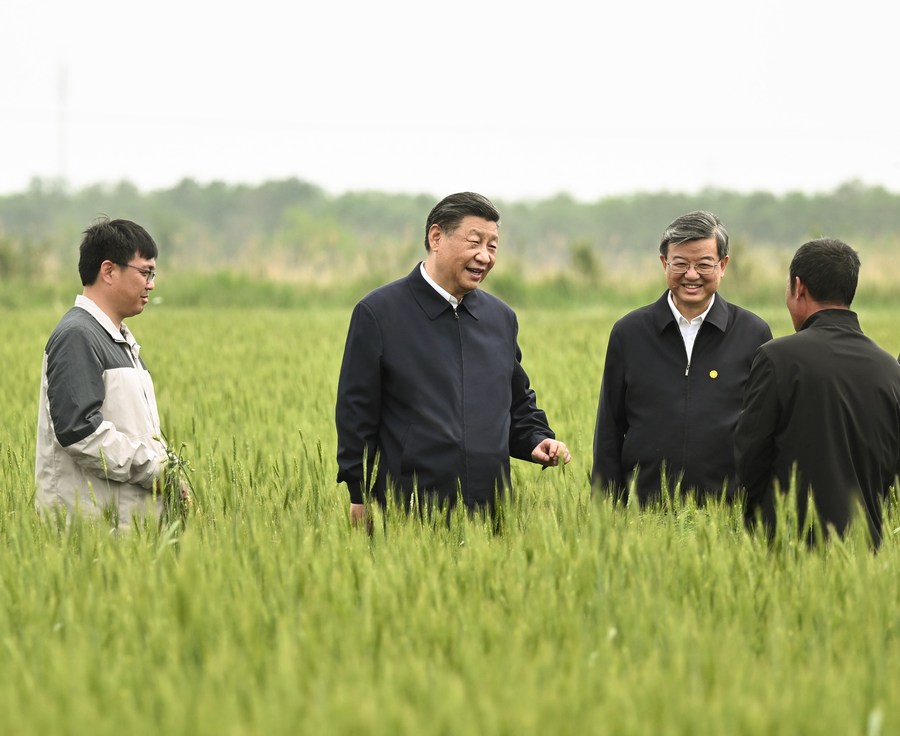 Chinese President Xi Jinping, also general secretary of the Communist Party of China Central Committee and chairman of the Central Military Commission, learns about the cultivation of crops tolerant of drought and alkalinity in a wheat field in Cangzhou, North China's Hebei province, May 11, 2023. [Photo/Xinhua]
Chinese President Xi Jinping, also general secretary of the Communist Party of China Central Committee and chairman of the Central Military Commission, learns about the cultivation of crops tolerant of drought and alkalinity in a wheat field in Cangzhou, North China's Hebei province, May 11, 2023. [Photo/Xinhua]
SHIJIAZHUANG -- Walking in a green wheat field in Cangzhou city in North China's Hebei province on Thursday morning, General Secretary of the Communist Party of China Central Committee Xi Jinping carefully examined the growth of the wheat and asked the farmers and agricultural technicians about the output, price, quality and earnings of the crops.
This wheat field is not an ordinary one, as only a few years ago the field was no more than a vast expanse of barren land, with a layer of white salt appearing on the soil surface in autumn. Now it is covered by lush green crops that are able to tolerate low rainfall and high alkalinity.
Saline and alkaline soil is dubbed the "incurable disease" of land due to its low yield characteristics. And parts of the land in Cangzhou City had been eroded by a high level of soil salinization and had little hope of seeing a high yield of wheat for many years.
China has about 1.5 billion mu (100 million hectares) of saline-alkali land, of which about 500 million mu is available for utilization. Managing and utilizing the land has always been a hard nut to crack for agricultural technicians, as it is a potential resource for safeguarding the country's food security.
During his inspection, Xi stressed the need to prioritize the comprehensive use of saline-alkali land, leverage the key role of scientific and technological innovation, expand the cultivation area of suitable crops and develop the intensive processing of farm products.
In fact, this is not the first time Xi has focused his attention on the saline-alkali land. In October 2021, when visiting the Agricultural High-tech Industrial Demonstration Area of the Yellow River Delta during an inspection tour in East China's Shandong province, Xi said the comprehensive use of saline-alkali soil is of strategic importance to national food security.
Having spent his early years in the rugged rural village of Liangjiahe in northwest China, Xi knows the feeling of real hunger and thus has aspired to secure China's food supply with the use of technological prowess in agricultural science.
During the 2020 "two sessions," Xi recalled his years as an educated youth in Liangjiahe and said, "I lived as a farmer for six or seven years. One time on an empty stomach, I asked the people around what made an ideal life."
"First, they said, was enough chaff to feed themselves so they wouldn't have to beg. Second, they craved grains such as sorghum rice and corn meal, and third -- a seemingly unattainable dream at that time -- was to have rice and flour on the table at any time, with a meal of meat regularly."
He then asked the farmers to dream higher. "Carrying a golden shoulder pole to the field in the future," the farmers joked.
"I believe the goal is also in the offing. The 'golden shoulder pole,' as I interpreted it, is agricultural modernization," Xi said.
This personal experience demonstrates why Xi has been putting great emphasis on ensuring agricultural modernization and developing agricultural science and technology. Whenever he inspects the agricultural industry, he always finds time to chat with farmers and agricultural technicians and give his instructions.
The crops he examined in Cangzhou are special varieties tolerant of drought and high alkalinity. They were developed by agricultural technicians to increase the yield and boost farmers' income.
"Farmers should be able to use the best technology to grow top-quality grains," Xi underscored multiple times.
Data reveals that China has kept its annual grain output steady at over 650 million tonnes for consecutive years, thanks to the vigorous development of agricultural science and technology.
Over the past decade, the contribution level of agricultural sci-tech progress in China had increased 7 percentage points to over 61 percent.